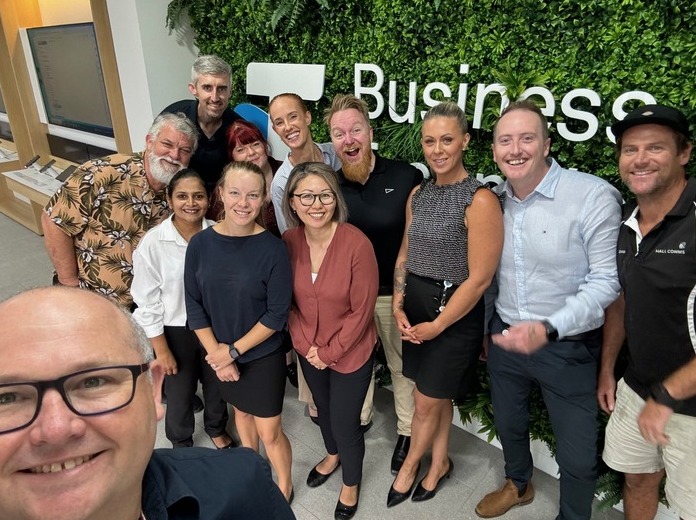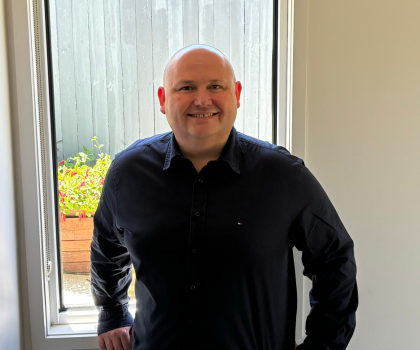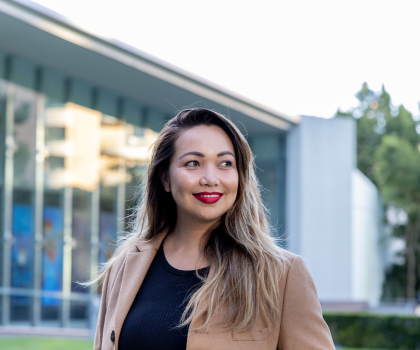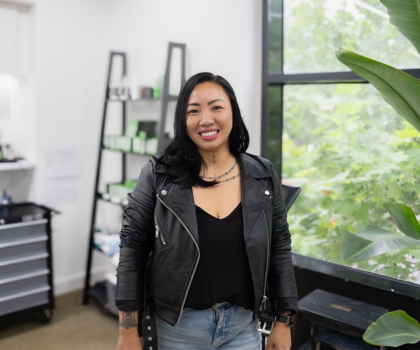
Damien is the QLD & NSW State Manager at Telstra Business. In this interview Damien shares his aspirations for the year ahead, insights into his personal and professional journey, and how he sees the telecommunication industry contributing to a more sustainable future.
As the State Manager – QLD & NSW, Telstra Business what does this involve? What does your day to day look like?
Having recently transitioned from Telstra Retail to Telstra Business as the State Manager for Queensland and New South Wales, my primary focus has been finalising the acquisition of all Telstra Business and Technology Centres, now under direct ownership and operation by Telstra. This extensive and intricate undertaking encompassed various aspects typical of an M&A project, ranging from property, IT, and data to inventory and people.
For me, the paramount concern has been ensuring a seamless experience for individuals transitioning to Telstra employees and establishing a cohesive culture right from Day 1. As a natural progression from the acquisition, a comprehensive program is now in motion to standardise and streamline systems, processes, and operations. The objective is to guarantee a consistent employee and customer experience across all the centres under our ownership.
A typical day and week for me involves overseeing the ongoing business performance against key metrics in sales, customer experience, and compliance. Additionally, I actively sponsor project to sustain the momentum of standardisation and optimisation efforts. Fortunately, my work allows me the flexibility to operate from various locations, including our main office in Brisbane, our centres scattered across the vast expanse of Queensland and New South Wales, and even my home office. It's genuinely refreshing to experience a change of scenery and engage face-to-face with my team, while sometimes even donning board shorts in my home office.
As a 2023 December MBA Graduate, can you provide a glimpse of your personal or professional goals and aspirations for this coming year?
I have two main professional goals for this year. The first is to build a resilient, highly capable and energised team of leaders that can manage through the change that is ahead, while ensuring that they each feel supported and able to maintain balance. This group will be my cultural architects, so its critical that they carry the feeling of support, being empowered and enabled.
Secondly, I want to land a clear vision for my entire business unit where everyone understands their daily role and how they contribute to the successful achievement of that vision. Inside of that its my intention to ensure that everyone understands the value that they bring and that they feel valued for their contribution.
On a personal front, now that I have time back in my life after finishing my MBA my goal is to spend more time present with my wife and two daughters who are growing up very fast. I also want to achieve another life goal of learning how to play the guitar. Music is a huge part of my life, a passion that I now share with my daughters, so it's time to learn to see what it feels like to make my own music.
What advice would you like to give yourself as you begin the New Year?
My advice boils down to staying disciplined and consistent in the behaviours that align with my purpose. Success has consistently accompanied me when I adhere to these two key principles. Discipline provides the structure and self-control needed, while consistency sustains progress by repeating positive actions. Together, they form the foundation for achieving and maintaining success in my life.
Can you share an experience where you applied the knowledge and skills you learnt through our values-based MBA?
During my Griffith University MBA, I had the opportunity to apply the knowledge and skills acquired through a real-world project that aligned with the program's ethos. Collaborating with the University of the Third Age (U3A), a prominent not-for-profit organisation dedicated to the wellbeing of seniors, we initiated a pilot program focused on enhancing the digital literacy of this vulnerable group.
Applying the principles learned in our values-based MBA, we approached this initiative with a holistic and empathetic perspective. Our team emphasised inclusivity, ensuring that the program catered to diverse needs and skill levels within the senior community. Through careful planning, effective communication, and a focus on the well-being of the seniors involved, we successfully executed the pilot program. The experience not only demonstrated the practical application of values-based leadership but also showcased the positive impact that thoughtful, sustainable initiatives can have on vulnerable communities. It was a testament to the effectiveness of merging business knowledge with ethical considerations, a cornerstone of our values-based MBA education.
Looking ahead, what do you see as the biggest opportunities and challenges for telecommunications companies to contribute to a more sustainable future, both at the state and national level? What role do you envision yourself playing in this?
Looking forward, the telecommunications industry is poised with significant opportunities and challenges in shaping a sustainable future, particularly concerning the deployment of 5G technology and the integration of green technologies. The advent of 5G presents a remarkable opportunity to enhance operational efficiency, offering the potential for smarter and more sustainable solutions in various sectors. Embracing this technology can drive energy efficiency and contribute to a more environmentally conscious telecommunications infrastructure.
Equally, the industry is confronted with challenges, notably in managing electronic waste and addressing the digital divide. The rapid evolution of technology leads to a surge in electronic waste, necessitating a concerted effort to implement responsible recycling practices and adopt a circular economy approach. Mitigating the environmental impact of electronic waste is essential for the industry to remain sustainable.
Moreover, ensuring that the benefits of telecommunications, particularly advancements like 5G, reach all segments of the population is a pressing challenge. The digital divide poses social and economic inequalities, making it imperative for the industry to focus on initiatives that bridge this gap.
I see myself playing a role in advocating for responsible practices, fostering innovation in green technologies, and promoting initiatives that prioritise digital inclusion. Through these efforts, the industry can not only capitalise on emerging opportunities but also address crucial challenges to pave the way for a more sustainable and equitable digital landscape.
Do you have any tips or advice to share with current MBA students or your former self?
Without doubt, engage deeply with your fellow students, lecturers, and the MBA support team. Outside of the great sounding board they all are, you will grow your network with amazing people. Finally, for your sanity, plan your time and be disciplined around course work and assessments.
What is one skill you could not live without and why?
One skill I could not live without is the ability to manage multiple priorities. This skill is essential for maintaining order and efficiency in both my professional and personal life. Effectively managing multiple tasks allows me to stay organised, meet deadlines, and handle a diverse range of responsibilities. In a world characterised by constant work demands and varied family commitments, the skill of managing multiple priorities enables me to navigate complexities, make informed decisions, and maintain a sense of balance and connection to my loved ones. It is a foundational skill that enhances overall productivity and adaptability, ensuring success in various aspects of life.
What is your favourite Griffith MBA memory?
Participating in the Regenerative Community Challenge early in the first year of my MBA was my favourite memory for sure! I was teamed up with two amazing colleagues to come up with a business idea that would solve an issue in the community and promote a move to a more circular-economy. The challenge was real, in that it was a real world issue and it was very demanding but I loved every minute of it.
As a cohort, we worked closely with Stephanie Schleimer (our amazing MBA director), Yas Grigaliunas from Circonomy (previously known as the World's Biggest Garage Sales), Clinton Schultz of Sobah and many more who were our coaches and judges.
While we didn’t win the challenge the experience was memorable and I would do it all over again!
If you have a question for Damien, we encourage you to connect on LinkedIn.
You may also like

Meet MBA Alumnus, Damien Lefrancke
Damien is the QLD & NSW State Manager at Telstra Business. In this interview Damien shares his aspirations for the year ahead, insights into his personal and professional journey, and how he sees the telecommunication industry contributing to a more sustainable future.

Meet MBA Student, Rachell Hansen
Rachell is the Acting Manager of the Future Economy & Strategy Team in the Department of Resources (Queensland). In this interview, Rachell gives us an insight into her core business, her professional aspirations and her MBA experience.

Meet MBA Alumnus, Teejay Bui-Mata'afa
MBA Alumnus, Teejay Bui-Mata'afa is the People and Culture Manager of Australia for Removery. In this interview, Teejay shares her unique professional journey across several industries and her aspirations for 2024.